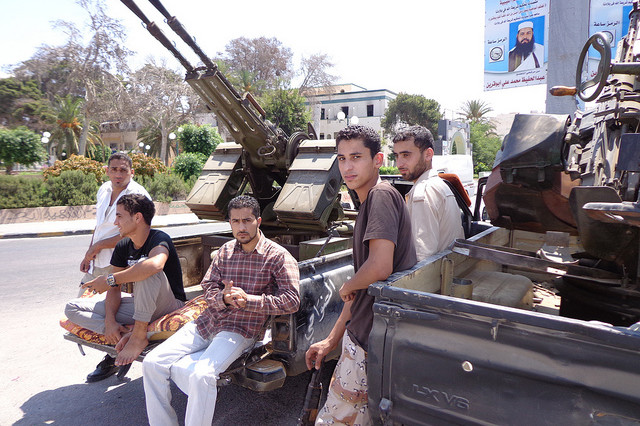From the wire:
WASHINGTON, Feb 25, 2011 (IPS) – In a distinct echo of the tactics they pursued to encourage U.S. intervention in the Balkans and Iraq, a familiar clutch of neo-conservatives appealed Friday for the United States and NATO to “immediately” prepare military action to help bring down the regime of Libyan leader Muammar Gaddafi and end the violence that is believed to have killed well over a thousand people in the past week.
The appeal, which came in the form of a letter signed by 40 policy analysts, including more than a dozen former senior officials who served under President George W. Bush, was organised and released by the Foreign Policy Initiative (FPI), a two-year-old neo-conservative group that is widely seen as the successor to the more-famous – or infamous – Project for the New American Century (PNAC).
Warning that Libya stood “on the threshold of a moral and humanitarian catastrophe”, the letter, which was addressed to President Barack Obama, called for specific immediate steps involving military action, in addition to the imposition of a number of diplomatic and economic sanctions to bring “an end to the murderous Libyan regime”.
In particular, it called for Washington to press NATO to “develop operational plans to urgently deploy warplanes to prevent the regime from using fighter jets and helicopter gunships against civilians and carry out other missions as required; (and) move naval assets into Libyan waters” to “aid evacuation efforts and prepare for possible contingencies;” as well as “(e)stablish the capability to disable Libyan naval vessels used to attack civilians.”
Among the letter’s signers were former Bush deputy defence secretary Paul Wolfowitz; Bush’s top global democracy and Middle East adviser; Elliott Abrams; former Bush speechwriters Marc Thiessen and Peter Wehner; Vice President Dick Cheney‘s former deputy national security adviser, John Hannah, as well as FPI’s four directors: Weekly Standard editor William Kristol; Brookings Institution fellow Robert Kagan; former Iraq Coalition Provisional Authority spokesman Dan Senor; and former Undersecretary of Defense for Policy and Ambassador to Turkey, Eric Edelman.
It was Kagan and Kristol who co-founded and directed PNAC in its heyday from 1997 to the end of Bush’s term in 2005.
The letter comes amid growing pressure on Obama, including from liberal hawks, to take stronger action against Gaddafi.
Two prominent senators whose foreign policy views often reflect neo-conservative thinking, Republican John McCain and Independent Democrat Joseph Lieberman, called Friday in Tel Aviv for Washington to supply Libyan rebels with arms, among other steps, including establishing a no-fly zone over the country.
On Wednesday, Obama said his staff was preparing a “full range of options” for action. He also announced that Secretary of State Hillary Clinton will meet fly to Geneva Monday for a foreign ministers’ meeting of the U.N. Human Rights Council to discuss possible multilateral actions.
“They want to keep open the idea that there’s a mix of capabilities they can deploy – whether it’s a no-fly zone, freezing foreign assets of Gaddafi’s family, doing something to prevent the transport of mercenaries (hired by Gaddafi) to Libya, targeting sanctions against some of his supporters to persuade them to abandon him,” said Steve Clemons of the New America Foundation, who took part in a meeting of independent foreign policy analysts, including Abrams, with senior National Security Council staff at the White House Thursday.
During the 1990s, neo-conservatives consistently lobbied for military pressure to be deployed against so-called “rogue states”, especially in the Middle East.
After the 1991 Gulf War, for example, many “neo-cons” expressed bitter disappointment that U.S. troops stopped at the Kuwaiti border instead of marching to Baghdad and overthrowing the regime of Saddam Hussein.
When the Iraqi president then unleashed his forces against Kurdish rebels in the north and Shia insurgents in the south, they – along with many liberal interventionist allies – pressed President George H.W. Bush to impose “no-fly zones” over both regions and take additional actions – much as they are now proposing for Libya – designed to weaken the regime’s military repressive capacity.
Those actions set the pattern for the 1990s. To the end of the decade, neo-conservatives, often operating under the auspices of a so-called “letterhead organisation”, such as PNAC, worked – often with the help of some liberal internationalists eager to establish a right of humanitarian intervention – to press President Bill Clinton to take military action against adversaries in the Balkans (in Bosnia and then Kosovo) as well as Iraq.
Within days of 9/11, for example, PNAC issued a letter signed by 41 prominent individuals – almost all neo-conservatives, including 10 of the Libya letter’s signers – that called for military action to “remove Saddam Hussein from power in Iraq”, as well as retaliation against Iran and Syria if they did not immediately end their support for Hezbollah in Lebanon.
PNAC and its associates subsequently worked closely with neo-conservatives inside the Bush administration, including Abrams, Wolfowitz, and Edelman, to achieve those aims.
While neo-conservatives were among the first to call for military action against Gaddafi in the past week, some prominent liberals and rights activists have rallied to the call, including three of the letter’s signatories: Neil Hicks of Human Rights First; Bill Clinton’s human rights chief, John Shattuck; and Leon Wieseltier of The New Republic, who also signed the PNAC Iraq letter 10 years ago.
In addition, Anne-Marie Slaughter, until last month the influential director of the State Department’s Policy Planning office, cited the U.S.-NATO Kosovo campaign as a possible precedent. “The international community cannot stand by and watch the massacre of Libyan protesters,” she wrote on Twitter. “In Rwanda we watched. In Kosovo we acted.”
Such comments evoked strong reactions from some military experts, however.
“I’m horrified to read liberal interventionists continue to suggest the ease with which humanitarian crises and regional conflicts can be solved by the application of military power,” wrote Andrew Exum, a counter-insurgency specialist at the Center for a New American Security, about Wieseltier. “To speak so glibly of such things reflects a very immature understanding of the limits of force and the difficulties and complexities of contemporary military operations.”
Other commentators noted that a renewed coalition of neo- conservatives and liberal interventionists would be much harder to put together now than during the Balkan wars of the 1990s.
“We now have Iraq and Afghanistan as warning signs, as well as our fiscal crisis, so I don’t think there’s an enormous appetite on Capitol Hill or among the public for yet another military engagement,” said Charles Kupchan, a foreign policy specialist at the Council on Foreign Relations (CFR).
“I support diplomatic and economic sanctions, but I would stop well short of advocating military action, including the imposition of a no-fly zone,” he added, noting, in any event, that most of the killing in Libya this week has been carried out by mercenaries and paramilitaries on foot or from vehicles.
“There may be some things we can do – such as airlifting humanitarian supplies to border regions where there are growing number of refugees, but I would do so only with the full support of the Arab League and African Union, if not the U.N.,” said Clemons.
“(The neo-conservatives) are essentially pro-intervention, pro-war, without regard to the costs to the country,” he told IPS. “They don’t recognise that we’re incredibly over- extended and that the kinds of things they want us to do actually further weaken our already-eroded stock of American power.”




Harald, I have a problem with your description of progressives. Progressives DON’T support the payouts to Wall St. The Dems do, but the Progressives want higher taxes on ultra-high earners. Just as the Libertarians are anti war, like progressives, where as the Republicans (and Dems) are pro-war.
The rats are coming out of their holes again, they must be smelling blood.
The neocons couldn’t care less about Libya, the Libyan people or anyone else in that region. Their main objective in this call is to set a precedent for future intervention by the US and other western forces.
The Libyan people and other countries in the region are better off left alone to fight this battle without any intervention. The only thing the US can do is to provide moral support.
If the americans are getting squeemish about the Libyans who have fallen in this revolution, let them remember IRAQ and 1.5 million killed by the last american intervention.
The neocons want to set a precendent so they can control who runs these countries and to make sure they are puppets they can manipulate.
Thanks, Scott, it’s very reassuring to know you don’t think I’m totally nuts. On the other hand, I am about to demonstrate that I am a complete fool, as I actually take the time to explain to you what I meant.
My comment re Iraq ’91 was based on the premise that the war was fought. That being so, it would have been wiser to go on for another three days and finish off the enemy’s forces. And in the ceasefire it would have been wise to prevent any Iraqi air activity, on purely humanitarian grounds. As I wrote, it would have saved thousands of Kurds and Marsh Arabs from death.
I did not mean to imply that the war itself was a good idea, or that I favored it. I realize that I should’ve wasted my time making that point originally, so I wouldn’t have to deal with your puerile comments now. But no — you would have some up with some other inanity instead. So until you die (or at least lose your internet service), I suppose I’ll just have to remember to ignore you.
The annihilation of the Republican Guard in ’91 would probably have led to the overthrow of Saddam. Whether his successor would have been any better, who knows. But it would likely have been an army general. Indeed, the biggest mistake in ’03 — that is, after the invasion itself — was Bremer’s dissolution of the army. That’s a big reason why Sunni and Shia extremists have come to the fore.